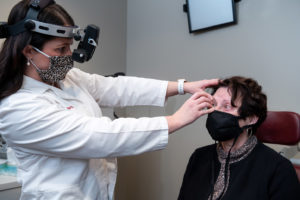CATARACTS
What are cataracts?
The lens in your eye is normally crystal clear, but when it becomes opaque, it is labeled a cataract. A cataract is NOT a growth or film, it is simply a clouding of our natural lens.
Early lens changes or opacities may not affect the vision significantly however as the lens continues to change, your vision becomes blurred. As the lens opacity worsens, it prevents the light coming in the eye from properly focusing on the retina. You may notice glare, haziness and difficult distance or driving vision.
What are the symptoms?
- Blurry, hazy vision or dim vision that requires brighter lights in order to read small print
- Increased glare and sensitivity to light, especially in bright sunlight or while driving at night
- A yellowing of the vision
- Distortion, ghosting or doubled images
- Increased nearsightedness that requires frequent changes in your glasses prescription
The exact cause of cataracts is unknown, although they may be a result of injury, illness such as diabetes, or various medications. Prolonged exposure to sunlight and smoking can also increase your chances of developing cataracts. To determine whether you have cataracts, your doctor performs a dilated eye exam to test your vision and assess the overall health of your lens and eye as a whole. If you’ve developed cataracts, no need to worry. Visionary Ophthalmology and Cataract Care offers a variety of cataract treatment options.
Treatment

You don’t need to let cataracts interfere with your ability
to work and enjoy life. If your vision is impaired, you may want to consider cataract surgery. Cataracts can only be removed with surgery.
Cataract removal surgery is the most commonly performed medical procedure in the country and It is extremely safe and produces outstanding results for most people. As with any surgery, there is a very minimal small risk of complications.
You can discuss your treatment options with your doctor at Visionary Ophthalmology and Cataract Care during your exam. It’s important to regularly schedule eye exams and catch visually impairing diseases, such as cataracts, early in their development.
Cataract Surgery Options
If you choose to improve your vision through cataract surgery, Visionary Ophthalmology and Cataract Care offers you three types of cataract treatments. Your choice will be determined by how dependent you are on glasses before your surgery and how well you can see without glasses after your surgery.
Here are our options for cataract surgery
- Basic Cataract Surgery with a basic fixed-focus lens implant to see clearly with bifocal glasses
- Laser Cataract Surgery with the Astigmatism Correction package to see far away without glasses
- Laser Cataract Surgery- Lifestyle Package with an advanced technology lens designed to see near and far without glasses
- Bladeless Cataract Surgery
Patients also have the option to choose bladeless cataract surgery. In this procedure, a computer-controlled, bladeless cataract laser performs the most critical steps of the cataract surgery procedure.
Visionary Ophthalmology and Cataract Care was among the first centers to offer this technique. Since then, bladeless cataract surgery has been one of the most popular choices among our patients.
The LenSx laser is the most technologically advanced option for cataracts patients today. A custom map of your eye is made using the laser which means the cataracts surgery procedure is 100 % customized.
Types of Lenses
After selecting the operation that is right for you, you’ll have your choice of the kind of lens used to replace your cataract.
Multifocal Intraocular Lens
The multifocal intraocular lens is designed to provide you with a full range of bright, sharp vision
These lenses can correct for nearsightedness, farsightedness and presbyopia (inability to focus on tasks without glasses).
This lens will free you from both cataract and presbyopia at the same time.
Astigmatism-correcting Intraocular lens
Astigmatism correcting Toric lens implants are exclusive, astigmatism correcting lens that treat both cataracts and astigmatism and can repair your stigmatism while replacing your clouded natural lenses.
Monofocal Lens
The monofocal lens is the most basic type of lens implant used to correct vision after cataract surgery
Get In Touch
(716) 634-4441
Location
40 N Union Rd #4
Williamsville, NY 14221
Open Hours
Mon: 8:00am – 4:30pm
Tue: 8:00am – 4:30pm
Wed: 8:00am – 4:30pm
Thur: 8:00am – 4:30pm
Fri: 8:00am – 4:30pm
Sat: Closed
Sun: Closed
